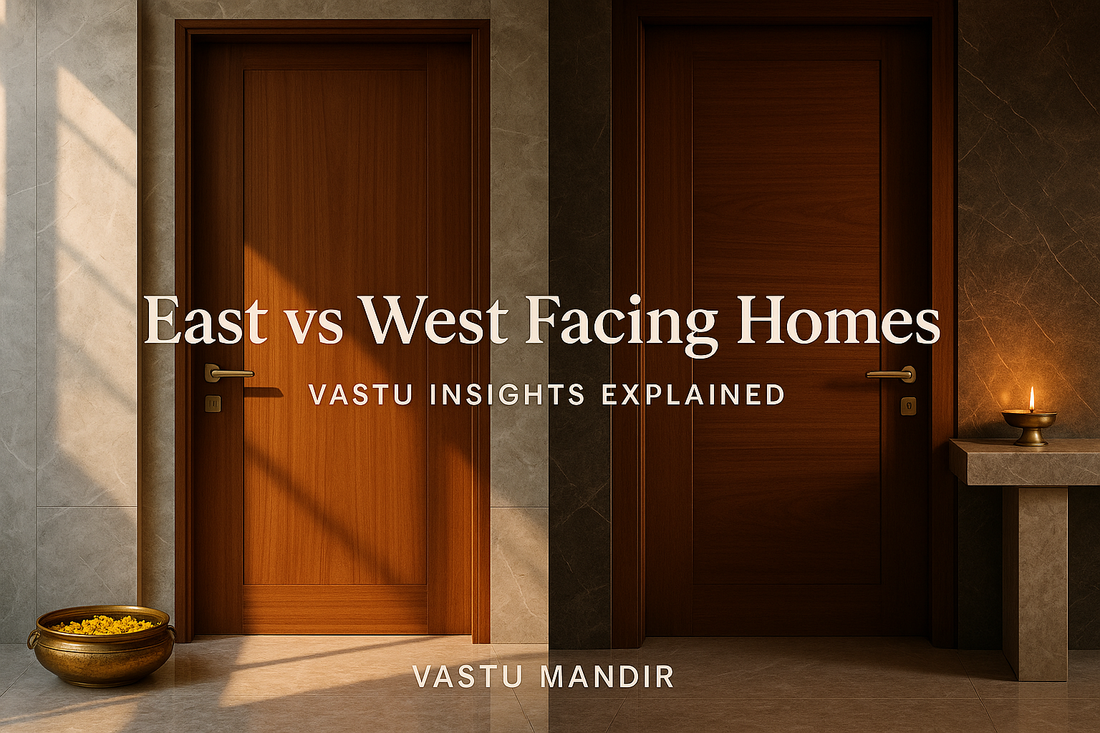
East vs. West Facing Homes: Vastu Insights for Modern Apartments
Vastu MandirShare
Introduction: The Modern Dilemma
Ask any new homeowner: “Is east-facing better than west-facing?” and you’ll hear strong opinions. In Vastu, directions matter, but not in the rigid way myths suggest.
In today’s apartments, gated communities, and urban layouts, you may not always get the “ideal” facing. The good news? With thoughtful placement, light, and remedies, both east and west-facing homes can feel balanced and prosperous.
What Does “Facing” Mean in Vastu?
In Vastu, the “facing” of a home is decided by the direction you face when standing at your main door looking outward.
-
If you face east, it’s an east-facing home.
-
If you face west, it’s a west-facing home.
This is different from where balconies or windows open—it’s about the main entrance, the point of energy flow.
East-Facing Homes: The Classic Preference
Traditionally, east-facing homes are celebrated in Vastu. Why?
-
Sunrise connection: East welcomes the first light of the day. This is linked to clarity, vitality, and new beginnings.
-
Spiritual alignment: Many temples open eastward.
-
Practical benefits: In apartments, east-facing flats often feel brighter in the morning, setting a calm tone for the day.
Who benefits most?
-
People in growth phases—students, professionals, entrepreneurs.
-
Families seeking a lively, fresh, optimistic environment.
West-Facing Homes: Stability & Strength
In older traditions, west-facing homes were considered less desirable. But in modern Vastu practice, west-facing homes are seen as stable, secure, and grounded.
-
Sunset glow: West-facing homes get evening light, ideal for families who spend more time at home in the evenings.
-
Practical living: In dense cities, west-facing apartments can often offer better views and layouts.
-
Symbolic meaning: The west connects to maturity, completion, and steady progress.
Who benefits most?
-
Families with working professionals (home feels alive after sunset).
-
People seeking stability and consolidation rather than constant new beginnings.
East vs. West: Key Comparisons
|
Aspect |
East-Facing |
West-Facing |
|
Sunlight |
Morning light (fresh, energizing) |
Evening light (warm, grounding) |
|
Symbolism |
Growth, clarity, new beginnings |
Stability, maturity, steady wealth |
|
Best suited for |
Students, entrepreneurs, new couples |
Settled families, long-term stability |
|
Common myth |
Always good |
Always bad |
|
Modern truth |
Good if maintained well |
Equally good if balanced with remedies |
Remedies for West-Facing Homes (Apartment-Friendly)
If you live in a west-facing home, don’t panic—it’s not unlucky. A few thoughtful touches balance the energy beautifully:
-
Main Door Brightness: Ensure the entrance is well-lit with neutral-warm light (5000–6000K).
-
Copper/Brass Strip: Place a flush strip at the threshold to strengthen the entry.
-
Symbols: Use auspicious symbols (Om, Swastik, Trishul) in brass or copper near the entrance.
-
Light Play: Keep interiors bright in the mornings with artificial lighting to balance the late daylight.
Remedies for East-Facing Homes
Even east-facing homes can feel off if neglected. Keep them aligned:
-
Clutter-Free Entrance: No shoe piles, dustbins, or random clutter near the main door.
-
Balanced Light: Don’t rely only on natural light—add warm lamps for evenings.
-
Regular Upkeep: East-facing doors often get early dust from sunlight—wipe daily.
-
Symbols & Pooja: A simple diya or idol near the entrance enhances the natural advantage.
What About North & South Facing Homes?
While this blog focuses on east vs. west, a quick note:
-
North-facing: Associated with career, opportunities, Mercury’s clarity. Popular in business hubs.
-
South-facing: Traditionally seen as challenging, but in modern Vastu, with remedies (metal strips, light corrections), it can work well too.
Everyday Truth: It’s About Balance
The direction of your door is just one part of Vastu. What matters more:
-
Light quality (avoid harsh blue LEDs, use warm CRI-rich lights)
-
Clean thresholds (no broken tiles, no uneven flooring)
-
Intentional symbols (a single diya, tortoise, pyramid—not cluttered objects)
-
Daily order (tidy shoes, clean nameplate, aligned rug)
An east-facing home that’s cluttered and dark may feel worse than a west-facing home that’s bright, orderly, and intentional.







